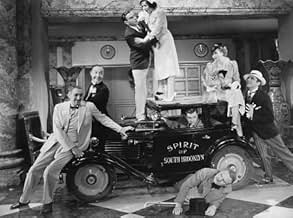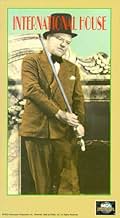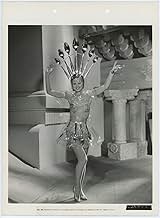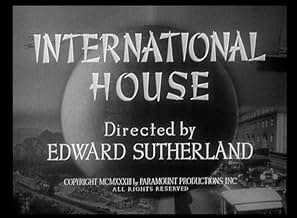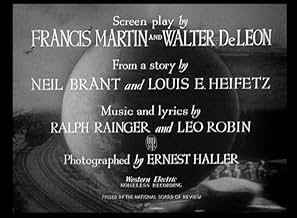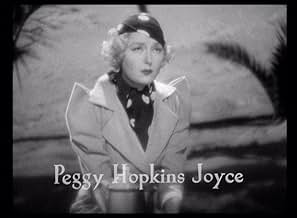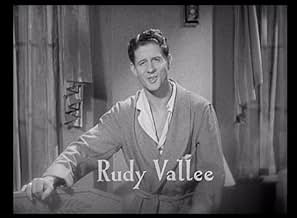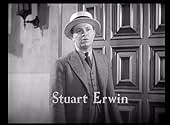VALUTAZIONE IMDb
6,8/10
1515
LA TUA VALUTAZIONE
Aggiungi una trama nella tua linguaAssorted wacky characters converge on a Chinese hotel to bid on a new invention: television.Assorted wacky characters converge on a Chinese hotel to bid on a new invention: television.Assorted wacky characters converge on a Chinese hotel to bid on a new invention: television.
- Regia
- Sceneggiatura
- Star
Rose Marie
- Rose Marie
- (as Baby Rose Marie)
Recensioni in evidenza
International House is the cinematic equivalent of a root beer float: not exactly nutritious, but it sure makes you feel good. This is the kind of movie that somehow creates an atmosphere of great comedy, even when the comedy isn't so great. Of course, it helps if you enjoy flicks of the Pre-Code era, the jazz and pop of the early '30s, and performers such as W.C. Fields, George Burns & Gracie Allen, Cab Calloway, etc. (Personally I love these folks, and relish seeing them in practically anything.) Even so, you may find that some of the punch-lines fall flat, either because they're based on obscure topical references or because they weren't all that funny in the first place, or maybe because the jokes are supposed to be dumb and the dumbness itself is the joke. In the end I have to conclude that whatever success this film achieves is due almost entirely to the charisma of the larger-than-life personalities of stage, screen, and radio assembled to put the material across. I can't think of another comedy with so many dead spots and missed opportunities that is so defiantly enjoyable anyhow.
Our story concerns the demonstration of a new invention, television, in a luxury hotel in Wu Hu, China. Dr. Wong, the inventor of this device (quaintly termed a "radio-scope" here) is entertaining bids from various international companies for the rights to his invention, and the competition for this prize forms what little plot there is. Clearly, the premise is just a flimsy excuse to throw together a batch of comic skits, songs, and star turns of one sort or another. Some of the stars have lost their luster with the passage of time; the male lead is a rather unappealing comic named Stuart Erwin who was mysteriously featured in several Paramount films of the period, while the leading lady is a once-famous celebrity named Peggy Hopkins Joyce who plays herself. Joyce was a former showgirl who was better known for marrying and divorcing millionaires than for her acting skill: the Zsa Zsa Gabor of her time. Happily, however, Erwin and Joyce quickly fade into the woodwork while we enjoy the antics of the more appealing players.
There's a lot to enjoy here: Gracie Allen as the ditsy dame, hotel manager Franklin Pangborn in full fuss-budget mode, a strangely out-of-place Bela Lugosi as one of Miss Joyce's jealous ex-husbands, and of course W.C. Fields as the drunken lecher Professor Quail. I've always enjoyed Fields a great deal but must confess I have mixed feelings about his work here. Quail isn't the long-suffering Dad of It's a Gift or the lovable rogue of The Old Fashioned Way, he's sour and generally obnoxious. For me this characterization plays better in some scenes (i.e. his confrontation with Gracie) than in others (his destruction of the telephone switchboard). Fields' funniest sequence is one in which he and Miss Joyce temporarily share a bedroom suite, while each is unaware of the other's presence. I also have mixed feelings about Burns & Allen's routines on this occasion, but even when their jokes are lousy they punch 'em across with sheer panache.
Who else is at the party? Well, Cab Calloway's music is great, and his number in the uncensored version of this movie, an up-tempo tribute to marijuana called "Reefer Man," is a real jaw-dropper -- no wonder it was cut from the T.V. prints! Baby Rose Marie, already a seasoned trouper at age 10, is downright eerie belting out her torch ballad like a low-down, red hot mama. Rudy Vallee's number has always been my cue to head for the john. And then, there are a couple of lingering mysteries: why is Dr. Wong is so doggedly determined to tune-in the six-day bicycle race at Madison Square Garden? And how did the two guys who call themselves Colonel Stoopnagle & Budd get into this movie? Their brief scene is a total dud, and their appeal escapes me completely. On the other hand, that musical number with the giant teacups, Sterling Holloway, and dancers with spoons in their hair makes me feel like I've suddenly ingested hallucinogenic mushrooms. In a nice way, I mean.
If nothing else this movie has given the world a notable punch-line, the one found in my subject heading above. This, of course, is Professor Quail's immortal retort to the fussy little hotel manager when he assumes the fellow is making a pass at him. I went to a public screening of International House recently and overheard two different people quoting the line in the lobby beforehand. If you find that line funny -- and I certainly do -- then this oddball comedy may suit your palate. After all, a root beer float now and again never killed anybody.
Our story concerns the demonstration of a new invention, television, in a luxury hotel in Wu Hu, China. Dr. Wong, the inventor of this device (quaintly termed a "radio-scope" here) is entertaining bids from various international companies for the rights to his invention, and the competition for this prize forms what little plot there is. Clearly, the premise is just a flimsy excuse to throw together a batch of comic skits, songs, and star turns of one sort or another. Some of the stars have lost their luster with the passage of time; the male lead is a rather unappealing comic named Stuart Erwin who was mysteriously featured in several Paramount films of the period, while the leading lady is a once-famous celebrity named Peggy Hopkins Joyce who plays herself. Joyce was a former showgirl who was better known for marrying and divorcing millionaires than for her acting skill: the Zsa Zsa Gabor of her time. Happily, however, Erwin and Joyce quickly fade into the woodwork while we enjoy the antics of the more appealing players.
There's a lot to enjoy here: Gracie Allen as the ditsy dame, hotel manager Franklin Pangborn in full fuss-budget mode, a strangely out-of-place Bela Lugosi as one of Miss Joyce's jealous ex-husbands, and of course W.C. Fields as the drunken lecher Professor Quail. I've always enjoyed Fields a great deal but must confess I have mixed feelings about his work here. Quail isn't the long-suffering Dad of It's a Gift or the lovable rogue of The Old Fashioned Way, he's sour and generally obnoxious. For me this characterization plays better in some scenes (i.e. his confrontation with Gracie) than in others (his destruction of the telephone switchboard). Fields' funniest sequence is one in which he and Miss Joyce temporarily share a bedroom suite, while each is unaware of the other's presence. I also have mixed feelings about Burns & Allen's routines on this occasion, but even when their jokes are lousy they punch 'em across with sheer panache.
Who else is at the party? Well, Cab Calloway's music is great, and his number in the uncensored version of this movie, an up-tempo tribute to marijuana called "Reefer Man," is a real jaw-dropper -- no wonder it was cut from the T.V. prints! Baby Rose Marie, already a seasoned trouper at age 10, is downright eerie belting out her torch ballad like a low-down, red hot mama. Rudy Vallee's number has always been my cue to head for the john. And then, there are a couple of lingering mysteries: why is Dr. Wong is so doggedly determined to tune-in the six-day bicycle race at Madison Square Garden? And how did the two guys who call themselves Colonel Stoopnagle & Budd get into this movie? Their brief scene is a total dud, and their appeal escapes me completely. On the other hand, that musical number with the giant teacups, Sterling Holloway, and dancers with spoons in their hair makes me feel like I've suddenly ingested hallucinogenic mushrooms. In a nice way, I mean.
If nothing else this movie has given the world a notable punch-line, the one found in my subject heading above. This, of course, is Professor Quail's immortal retort to the fussy little hotel manager when he assumes the fellow is making a pass at him. I went to a public screening of International House recently and overheard two different people quoting the line in the lobby beforehand. If you find that line funny -- and I certainly do -- then this oddball comedy may suit your palate. After all, a root beer float now and again never killed anybody.
Certainly one of the funniest of the pre-code comedies. The premise of different bidders coming together to bid on the rights to the TV system is just an excuse to get alot of talent together, from W.C. Fields to Cab Calloway. The Burns & Allen segments are great here. That corny vaudeville shtick never worked better! Franklin Pangborn is in his element as the prissy, flustered hotel manager. God, he was hilarious! Too many great moments to try to list here. Thankfully this one is available in a great quality video and it's a shame that it isn't (yet) available on DVD (along with the other Fields Paramounts). Typical of the kinds of comedies that Hollywood (and Paramount in particular) excelled at during the Depression years. However, this one just has it all. Excellent absurd humor (Fields definitely paved the way for Monty Python and the like, believe it or not). This is not art or anything like that, don't expect a Chaplin or Keaton style film. No, this is just good, wacky fun, which is fine. If you liked INTERNATIONAL HOUSE be sure to check out the excellent Paramount comedy, MILLION DOLLAR LEGS (1932), also with W.C. Fields. This is a film with a similar vein of absurd comedy. At any rate, INTERNATIONAL HOUSE is a genuine classic comedy movie.
A lot of commotion falls upon the International House hotel in Wu Hu China. Doctor Wong is planning to demonstrate a new television device and sell it to Tommy Nash, representative of the American Electric Company. Nash escorts Peggy Hopkins Joyce to the hotel as well, which makes his fiancé jealous. Also jealous is Joyce's ex-husband, Gen. Nicholas Petronovich, who is also trying to buy the invention. Gen. Petronovich tries to have Nash quarantined, but only succeeds in quarantining the hotel, with him outside the hotel. The arrival of Prof. Quail, millionaire and drunkard, creates more chaos in the hotel with his crude manners, and enrages Gen. Petronovich when he mistakenly believes Quail is sleeping with Peggy. The International House turns into madness as everyone tries to return the hotel to normal. The movie is entirely plot less, but relies on its silliness to move along, and it works. Fields is a riot drunkenly stumbling around delivering his trademark one liners. Many of the other big stars make appearances via Wong's television (Rudy Vallee, Cab Calloway, Stoopnagle and Budd). Gracie Allen's hair-brained lines have a slight logic behind them to make them funny. The movie seemed to be a bit too chaotic at times, but the chaos works in certain scenes. Rating, 7
Why did Gracie Allen's sister learn French? Because she inadvertently took home a French baby, rather than her own, and wanted to be able to talk to him when he grew up. And why does cheerfully soused W.C. Fields have a roadster in his auto-gyro? For side-trips, of course -- like the one that takes him careening through the corridors, lounges and lobbies of the grandest hotel in Wu Hu China. It's right across the street from the flophouse where Bela Lugosi as gold digger Peggy Ann Joyce's insanely jealous ex-husband has been forced to reside. As for how Cab Calloway, singing a tribute to the heady pleasures of pot, and Rudy Vallee, serenading his megaphone, wander into the movie, they're among the images scanned up by a Chinese inventor who's attempting to televise a six-day bike race before television (as we know it today) was invented. Other pleasures in "International House" range from ten-year-old baby RoseMarie (who would eventually be the adult RoseMarie of the "Dick Van Dyke Show") doing a Sophie Tucker low blues and some surprisingly agile hoofing by Sterling Halloway. Fields' mumbling, bumbling, boozy millionaire staggers off with the comedy honors. But you don't even have to be Wiliam Claude Dukenfeld fan to find a lot to enjoy.
Although he's on the screen for only half the time this is classic early Fields. Before he became the put upon family man he was this obnoxious but nevertheless hilarious blustering boasting egomaniac. Perfect scene with him and Gracie Allan. Fields is at his nastiest best here- "what is the penalty for murder in China?" Gracie Allan is equally funny with George Burns impeccable as her comedy foil. I loved the line about not telling where she went to school.. There are other highlights as well.Skip the stupid romance and most of the Peggy Hopkins Joyce scenes but enjoy the pre-code sexiness, particularly in the Tea-Cup number and Fields comment after looking in a key hole at the hotel. A fast wild ride a'la 30's comedy and not to be missed by fans of the genre.
Lo sapevi?
- QuizDuring the filming of one of W.C. Fields' scenes, a mild earthquake struck Los Angeles. The earthquake was supposedly captured on film. In the film clip, Fields and his co-stars are standing in the hotel lobby set, when the picture begins to shake as if the camera is vibrating. A chandelier on the set begins to swing back and forth, and a lamp suddenly falls over. Fields calmly ushers his co-stars off the soundstage, telling them to stay calm and walk slowly. The "earthquake footage" of Fields was played in newsreels across the country in the weeks following the 1933 quake. Nearly forty years later, however, director A. Edward Sutherland admitted that the "earthquake footage" was a hoax concocted by himself and Fields. It was done by rigging wires on the lamp and chandelier, and shaking the camera to simulate an earthquake. Sutherland claimed that he and Fields were amazed when the "earthquake footage" was accepted as genuine by newsreel distributors. "We shared a big laugh and an even bigger drink", Sutherland recalled. To this day, the fake "earthquake footage" is occasionally broadcast and accepted as genuine by entertainment television shows such as Access Hollywood (1996). The footage appeared in Hollywood Out-takes and Rare Footage (1983).
- BlooperDuring the scene where Prof. Henry R. Quail is by his auto gyro talking to Doctor Wong and Peggy Hopkins Joyce, you can see the shadow of the boom mic moving above their heads. The boom mic then hits something, presumably the auto gyro, making a noise which makes Prof. Henry R. Quail and Peggy Joyce look up.
- Citazioni
Professor Quail: Hey! Where am I?
Woman: Wu-Hu.
Professor Quail: Woo-Hoo to you sweetheart. Hey Charlie, where am I?
Hotel Manager: WU-HU!
[Professor Quail removes the flower from his lapel]
Professor Quail: Don't let the posey fool you!
- ConnessioniFeatured in Oops, those Hollywood Bloopers! (1982)
- Colonne sonoreShe Was a China Tea-cup and He Was Just a Mug
(1933) (uncredited)
Lyrics by Leo Robin
Music by Ralph Rainger
Sung offscreen by an unidentified man and danced by Sterling Holloway, Lona Andre,
Mary Jane Sloan, Gwen Zetter and Chorus
I più visti
Accedi per valutare e creare un elenco di titoli salvati per ottenere consigli personalizzati
- How long is International House?Powered by Alexa
Dettagli
- Tempo di esecuzione1 ora 8 minuti
- Colore
- Proporzioni
- 1.37 : 1
Contribuisci a questa pagina
Suggerisci una modifica o aggiungi i contenuti mancanti

Divario superiore
By what name was International House (1933) officially released in India in English?
Rispondi

